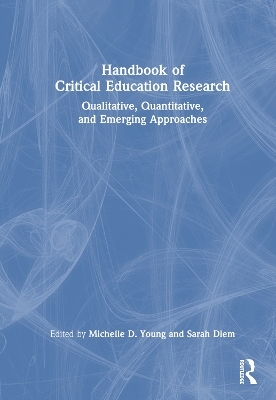
Handbook of Critical Education Research
Routledge (Verlag)
978-0-367-68861-5 (ISBN)
Michelle D. Young is Dean of the Berkeley School of Education and Professor of Education Policy and Leadership at University of California – Berkeley, USA. Sarah Diem is Professor of Educational Leadership and Policy Analysis at the University of Missouri, USA.
Section 1: Introduction: Why Critical Research? Why Now? Section One Introduction 1. Critical Education Research: Emerging Perspectives on Methods and Methodologies 2. The Paradigm Wars Reconsidered: Looking for a Legacy 3. Critical Approaches to Quantitative Research: Review, Critique, and Applications 4. Black in Time: Critical Research Practices for Studying Anti-Blackness in Schools Section 2: Epistemology, Theory, and Paradigms Section Two Introduction 5. Education and Colonialism: Three Frameworks 6. The White Supremacist Core Ontological Architecture of Western Modernity 7. Queering Critical Educational Research: Methodological Activism Within a Cultural Location of the ‘Not Yet’ 8. Reflexivity 10.6: The Matter of Reflexivity or What Matter Matters in Postqualitative Inquiry 9. The Spatial Logic of Epistemic Imaginaries: Guided by Édouard Glissant 10. Where Are the Black Folx? A Queer Critical Race Theory Intersectional Analysis Section 3: Introduction: Critical Qualitative Research Design Section Three Introduction 11. Toward Critical Approaches to Case Study Research 12. Critical Ethnography in Education Research: More Than a Method 13. Critical Auto (-/) Ethnography in Everyday and Educational Research for Social Justice 14. Critical Narrative Inquiry: Reaching Toward Understanding, Moving to Resistance, and Acting in Solidarity 15. A "Good" University: Community-based Critical Participatory Action Research, University-Community Relations, and Affordable Housing 16. Using Critical Discourse Analysis to Challenge and Change Educational Practice and Policy 17. Toward a Critical History of Education: The Uses of the Past and its Possibilities for the Present Section 4: Introduction: Critical Quantitative Research Design Section Four Introduction 18. (Un)Learning White Supremacy Ideologies to Advance Critical Approaches to Quantitative Inquiry 19. Applied Quantitative Inquiry through a Critical Disability Studies Lens 20. Critical Quantitative Intersectionality: Maximizing Integrity in Expanding Tools and Applications 21. What is the Point?: Reimagining the Critical Quantitative Research of Big and Large-Scale Data Sets to Advance Racial Equity: Section 5: Introduction: Critical Emerging Approaches Section Five Introduction 22. Disrupting the Binary: Critical Mixed-Methods as Academic Resistance 23. Critical Networks in Critical Times 24. Critical Space Analysis: Integrating Geographic Information Systems into Critical Educational Research 25. Multimodal Inquiries Inspired by Post-Philosophies: More-than-Human Relationalities that Produce (Critical) Inquiry(ies) Section 6: Introduction: Data Collection in Critical Research Section Six Introduction 26. Listening and Learning Through Critical Interviewing Approaches in Qualitative Inquiry 27. Oral History as Critique: Memories Disrupting the Dominant Narrative 28. Critical and Feminist Cartographies of Observation: Procedural, Personal, and Political Considerations in the Documentation and Analysis of Life Worlds 29. Critical Survey Research Section 7: Introduction: Critical Data Analysis Section Seven Introduction 30. Using Qualitative Data Analysis Software to Help Explore Critical Research Questions: A Tool, Not a Replacement 31. Shifting Policy Meanings: Argumentative Discourse Analysis and Historical Policy Research 32. The Ethics and Bureaucratization of Data Management 33. Advancing QuantCrit in Critical Race Spatial Research: Exploring Methodological Possibilities by Mapping Chicanx Baccalaureate Attainment 34. Beyond Representation: Decoloniality Content Analysis as a Methodology to De/Reconstruct the Sociology of Expectations in Curriculum Section 8: Introduction: Politics and Ethics of Doing Critical Educational Research Section Eight Introduction 35. Critical Educational Research and Social Movements 36. "To Whom Are We Accountable?": Exploring the Tensions Inherent within Critical Scholarship 37. Families and Educators Co-Designing: Critical Education Research as Participatory Public Scholarship 38. Validity as Democratic Deliberation: The Pragmatist Imperative for Critical Inquiry 39. Topographies of Research as Relational: Exploring the Politics and Ethics of Positionality and Relationality in Research Processes 40. Institutional Review Boards: Processes and Critiques
| Erscheinungsdatum | 27.07.2023 |
|---|---|
| Zusatzinfo | 18 Tables, black and white; 7 Line drawings, black and white; 19 Halftones, black and white; 26 Illustrations, black and white |
| Verlagsort | London |
| Sprache | englisch |
| Maße | 178 x 254 mm |
| Gewicht | 1823 g |
| Themenwelt | Sozialwissenschaften ► Pädagogik ► Allgemeines / Lexika |
| Sozialwissenschaften ► Pädagogik ► Bildungstheorie | |
| ISBN-10 | 0-367-68861-1 / 0367688611 |
| ISBN-13 | 978-0-367-68861-5 / 9780367688615 |
| Zustand | Neuware |
| Haben Sie eine Frage zum Produkt? |
aus dem Bereich


